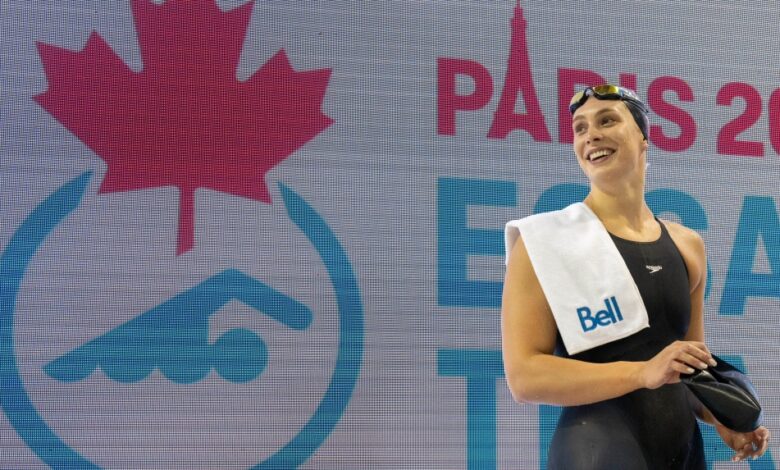Paris Olympics: Swimmer Penny Oleksiak set to battle

Canada’s most decorated athlete learned the power of grace heading into her third, but perhaps not her last, Olympic Games.
Owner of seven Olympic swimming medals at just 23 years old, Penny Oleksiak’s three years since Tokyo threw two knee surgeries and a shoulder injury at her, limiting her ability to train and compete.
When she felt stuck, Oleksiak executed a rite of passage into adulthood by figuring out how to get unstuck. That involved leaving her hometown of Toronto.
“If I had to sum it up in one word, it would probably be ‘unexpected,'” Oleksiak said. “I’ve had a very trying last couple years and a lot of things happening back-to-back.
“It’s been a really different experience for me. I’ve learned a lot about myself in the last few years, how much patience I have and how to give myself grace in a lot of situations.”
Oleksiak didn’t qualify for an individual event in Paris. She’ll be deployed in relays starting with the women’s 4 x 100 freestyle Saturday.
“It’s been hard definitely to wrap my head around the fact that I’m not competing in an individual event, but I’m still competing in quite a few events,” Oleksiak said. “I’m still aiming to do some really impressive things, and training really hard to be able to do those things and contribute to the team as much as I have in the past and see what impact I can have.
“I’m always looking at it through a really realistic lens of, as an athlete, my goals are always to be on the podium. I don’t think that’s going to change at this Olympics.”
Her seven medals are the most won by a Canadian Olympian. Oleksiak’s been a relay gamer throughout her career.
She anchored the 4 x 100 freestyle relay to silver and the medley relay to bronze in Tokyo after a pair of relay bronze medals in Rio in 2016.
All nine of her world championship medals — the most by a Canadian swimmer — are in relays.
At 16, Oleksiak won gold in 100-metre freestyle and silver in 100-metre butterfly in Rio. She was a bronze medallist in the 200-metre freestyle in Tokyo.
“For the first time at this Olympics, I’m going to have that little bit of alleviated pressure, because I think when you’re on a relay and you’re surrounded by other girls, it really does take that pressure off, and you don’t feel as lonely when you’re in the ready room,” Oleksiak said.
She moved to Mission Viejo, Calif., in 2023 to join a group of international pro swimmers coached by Jeff Julian. She’d been training out of Toronto’s Pan Am Sports Centre since the age of 15.
“I really needed a change of scenery,” Oleksiak said. “Spending a year at the centre with my injury was really frustrating for me. It felt like I was stuck. I kept wanting a different result, but not doing anything differently to get that result.
“I’ve been really lucky with the support team I have out in California for my training. I’m surrounded by really amazing and talented people who are really good at what they do. I’ve had people helping me non-stop literally all the time. I’m surrounded by the best of the best people at rehabbing these kinds of injuries, the best people at researching these injuries.
“This is one of the first times that I’ve felt like, ‘OK, I have confidence when I do get injured in knowing I’m going to be able to come back.'”
That has Oleksiak thinking Los Angeles in 2028 when she was once sure Paris would be her final Olympic Games.
“It’s really made me want that longevity out of my career,” she said. “Through my injuries, a lot of people told me ‘you don’t have to do this. You’ve achieved a lot, you could retire.’ I was just like ‘I hate that people are saying this to me. I hate that people think I don’t want to do this.’
“Through my injuries is really when I found that motivation in knowing that I really wanted to do something.”
Ontario leads all provinces in the 338 athletes named to the Canadian team with 141.
Oleksiak is among Olympians such as teammate Maggie Mac Neil and sprinter Andre De Grasse supported by Quest For Gold, which is funded by the Ontario government and Ontario Lottery and Gaming Corporation. Oleksiak has been a recipient for a decade of a program that’s delivered $151 million to athletes since 2006.
“Without that financial support, I don’t think I would have been able to pursue swimming as much as I have,” she said. “Growing up, it really helped me a lot being able to go to swim meets that my family wouldn’t have been able to pay for or been able to go to training camps otherwise.”
This report by The Canadian Press was first published July 23, 2024.




